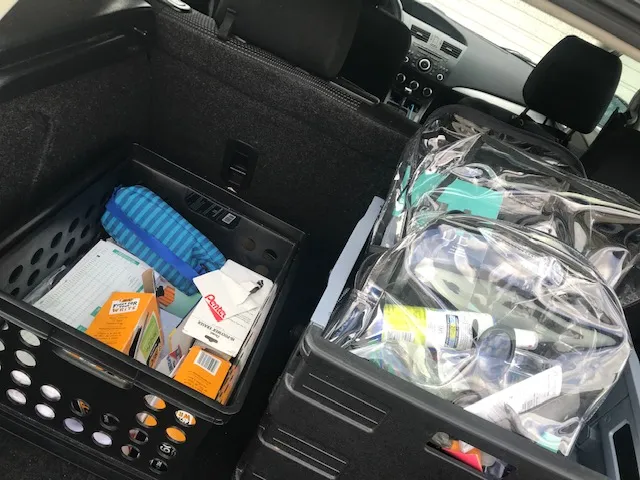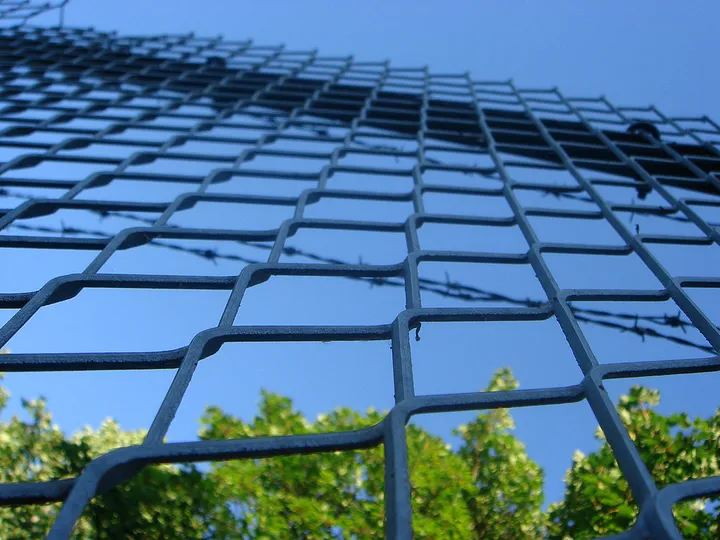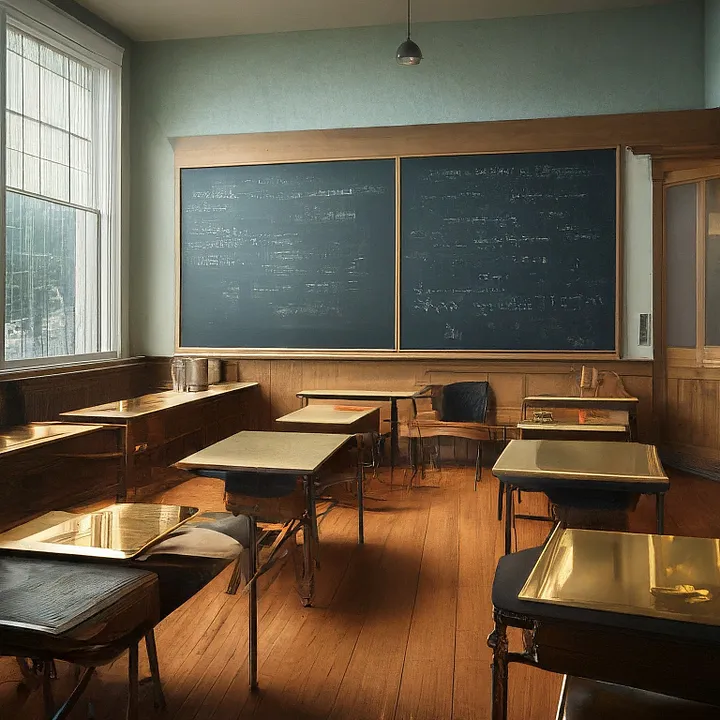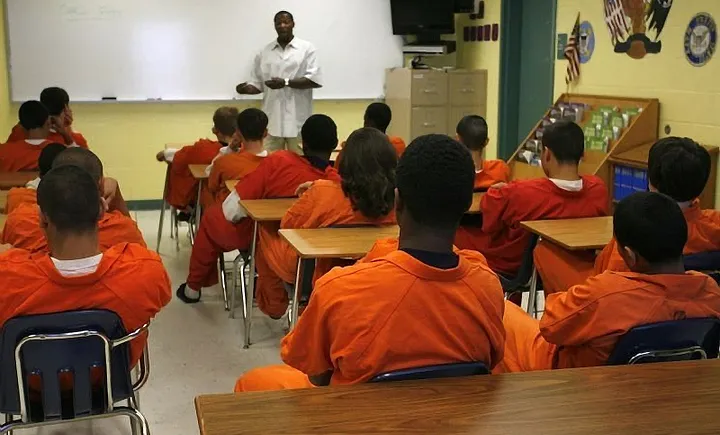The Language of Power: Hard-Won Lessons from Teaching Behind Bars
(This was written before the recent CoronaVirus Outbreak, and some of the lessons and experiences with teaching inside have already changed dramatically).

Lessons Learned so far: I am teaching composition. There are some real differences between teaching on campus and teaching inside, so it has not been a seamless transition, which was not surprising. Pro-tip: Do not put anything in the supply cabinet. It will be gone when you get back. The students do not have access to this cabinet, so it is probably not them. It is probably another educator. We are all office supply thieves at heart. I am a hardened pen thief myself. There is a real run on office supplies inside. Something that I take for granted like having a pen or paper to do homework with is really valuable. Bring it in with you and take it with you when you leave. That is a pain, but in some facilities the students do not have paper, or they have to buy the paper on their own, which is hard when they are using some of their available time to take my class. I am trying to teach writing. Paper and pens are pretty necessary. I just threw bundles of papers into the recycler the other day because the printer messed up a little bit. It really makes you think about the things we take for granted. In addition to supply issues, there are some differences in the way I run my class. For example, I have had to limit the amount of call and response kinds of questions I ask. The students are very excited to participate, so it can get a little loud. It requires a little bit more management partly because of their excitement for us to be there. It makes it harder to manage, but it also makes me feel more enthusiastic as well. I have only been working in this program for a month, so there is still plenty to learn and different techniques to try out.
A few months ago, the program had its first graduation. Since I am new, none of the new graduates were students of mine. I am looking forward to future graduations so that I get the chance to hear about what some of our students do with this opportunity as it will continue to inform my response to the question of why I am doing what I am doing.
Language of Power: One of my students asked me why I was making them write in this way. I have been asked this question on campus as well, though not as frequently. I had a more precise answer for my students on the inside. I am teaching you the language of power. People who have control over your lives write like this and speak like this. If you do not know how to communicate like them then you are at a disadvantage. Another student asked: like how the lawyers talk? Yes, and everyone else you talk with who has power. That seemed to motivate some of the students who were not as motivated before though I have less trouble with a lack of motivation inside than I do on the outside.
Lessons Learned: “It is all your fault” one of my students said as he stuck his head in the door during their break. They are not really supposed to come back into the classroom until the break is over. The private facility is more strict about this than the government facilities. I have a hard time saying no to students when they want or need help, so I end up spending our entire break answering questions most days. After all, they do not have the opportunity to come to my office hours. This time, my student did not have a question, but he did want to tell me something.
Me: “Oh? What is my fault?”
Student: “The conversation is still going on out there!”
Me: “Fantastic! That is so great!”
We had a discussion before break about the reading, and they were so engaged with the topic that they continued the discussion. We did have to move on to working on the research essay, so I am glad I gave them the break first. Sometimes they can get a little loud because everyone wants to say something. Last week one of the Correctional Officers came into the classroom to see what was going on because we were so loud. We do eventually have to get back to the writing, but it is nice to talk with students who have something to say, and lots of questions.
At first I was finding it hard to maintain control over the students with all of their questions and comments. It led to a conversation with the director of education, correctional officers, and with the class itself. The solution offered by employees of the prison was to just press the emergency button and have the guards come in and crack some heads.
Me: Because they were a little too loud and were a bit rude? That seems like an overreaction.
Them: They would not do it again.
True. If I pressed the emergency button, the students would not do it again, but they also would not say anything in class anymore, and it would hinder their learning. I am not an employee of the prison system, and my purpose in being there is not to control them or to punish them or even to rehabilitate them; it is to teach them. I have dealt with boisterous classes before, and I have never felt the need to call in a bruiser to deal with them. So I did what I usually do, I changed their seating arrangement every week. They could not form little groups of people chatting to themselves if they were not by their friends. Educators can find other ways to manage a class. We do not always have to drop the hammer.
The interactions with the students in the prison setting are really rewarding for the instructors and hopefully the students as well. The coronavirus outbreak has put a stop to all face-to-face teaching in the prison system. My next blog post will be about the effect it has had on our teaching. We are trying to make the best out of this situation, but all of us want to eventually go back inside. Having interactions with someone who is communicating with these students about something other than their behavior or the past mistakes they have made is really important and means a lot to them. I was evaluated by the students last semester as part of the normal evaluation process. I have not had a chance to read all my evaluations (which I cannot read until after the grades are submitted for the semester), but during my meeting with my committee, one of my committee members read a comment to me from one of my students. He said: she never looks at me like I am a level four criminal. She said there were a lot of comments like that and if I am ever feeling low, I should go and read through them. As soon as this is over, I will, and I hope we can go back in soon because besides teaching the Inmate Scholars the content of the course, personal interaction is important too.
(This was written before the recent CoronaVirus Outbreak, and some of the lessons and experiences with teaching inside have already changed dramatically).

Lessons Learned so far: I am teaching composition. There are some real differences between teaching on campus and teaching inside, so it has not been a seamless transition, which was not surprising. Pro-tip: Do not put anything in the supply cabinet. It will be gone when you get back. The students do not have access to this cabinet, so it is probably not them. It is probably another educator. We are all office supply thieves at heart. I am a hardened pen thief myself. There is a real run on office supplies inside. Something that I take for granted like having a pen or paper to do homework with is really valuable. Bring it in with you and take it with you when you leave. That is a pain, but in some facilities the students do not have paper, or they have to buy the paper on their own, which is hard when they are using some of their available time to take my class. I am trying to teach writing. Paper and pens are pretty necessary. I just threw bundles of papers into the recycler the other day because the printer messed up a little bit. It really makes you think about the things we take for granted. In addition to supply issues, there are some differences in the way I run my class. For example, I have had to limit the amount of call and response kinds of questions I ask. The students are very excited to participate, so it can get a little loud. It requires a little bit more management partly because of their excitement for us to be there. It makes it harder to manage, but it also makes me feel more enthusiastic as well. I have only been working in this program for a month, so there is still plenty to learn and different techniques to try out.
A few months ago, the program had its first graduation. Since I am new, none of the new graduates were students of mine. I am looking forward to future graduations so that I get the chance to hear about what some of our students do with this opportunity as it will continue to inform my response to the question of why I am doing what I am doing.
Language of Power: One of my students asked me why I was making them write in this way. I have been asked this question on campus as well, though not as frequently. I had a more precise answer for my students on the inside. I am teaching you the language of power. People who have control over your lives write like this and speak like this. If you do not know how to communicate like them then you are at a disadvantage. Another student asked: like how the lawyers talk? Yes, and everyone else you talk with who has power. That seemed to motivate some of the students who were not as motivated before though I have less trouble with a lack of motivation inside than I do on the outside.
Lessons Learned: “It is all your fault” one of my students said as he stuck his head in the door during their break. They are not really supposed to come back into the classroom until the break is over. The private facility is more strict about this than the government facilities. I have a hard time saying no to students when they want or need help, so I end up spending our entire break answering questions most days. After all, they do not have the opportunity to come to my office hours. This time, my student did not have a question, but he did want to tell me something.
Me: “Oh? What is my fault?”
Student: “The conversation is still going on out there!”
Me: “Fantastic! That is so great!”
We had a discussion before break about the reading, and they were so engaged with the topic that they continued the discussion. We did have to move on to working on the research essay, so I am glad I gave them the break first. Sometimes they can get a little loud because everyone wants to say something. Last week one of the Correctional Officers came into the classroom to see what was going on because we were so loud. We do eventually have to get back to the writing, but it is nice to talk with students who have something to say, and lots of questions.
At first I was finding it hard to maintain control over the students with all of their questions and comments. It led to a conversation with the director of education, correctional officers, and with the class itself. The solution offered by employees of the prison was to just press the emergency button and have the guards come in and crack some heads.
Me: Because they were a little too loud and were a bit rude? That seems like an overreaction.
Them: They would not do it again.
True. If I pressed the emergency button, the students would not do it again, but they also would not say anything in class anymore, and it would hinder their learning. I am not an employee of the prison system, and my purpose in being there is not to control them or to punish them or even to rehabilitate them; it is to teach them. I have dealt with boisterous classes before, and I have never felt the need to call in a bruiser to deal with them. So I did what I usually do, I changed their seating arrangement every week. They could not form little groups of people chatting to themselves if they were not by their friends. Educators can find other ways to manage a class. We do not always have to drop the hammer.
The interactions with the students in the prison setting are really rewarding for the instructors and hopefully the students as well. The coronavirus outbreak has put a stop to all face-to-face teaching in the prison system. My next blog post will be about the effect it has had on our teaching. We are trying to make the best out of this situation, but all of us want to eventually go back inside. Having interactions with someone who is communicating with these students about something other than their behavior or the past mistakes they have made is really important and means a lot to them. I was evaluated by the students last semester as part of the normal evaluation process. I have not had a chance to read all my evaluations (which I cannot read until after the grades are submitted for the semester), but during my meeting with my committee, one of my committee members read a comment to me from one of my students. He said: she never looks at me like I am a level four criminal. She said there were a lot of comments like that and if I am ever feeling low, I should go and read through them. As soon as this is over, I will, and I hope we can go back in soon because besides teaching the Inmate Scholars the content of the course, personal interaction is important too.
(This was written before the recent CoronaVirus Outbreak, and some of the lessons and experiences with teaching inside have already changed dramatically).

Lessons Learned so far: I am teaching composition. There are some real differences between teaching on campus and teaching inside, so it has not been a seamless transition, which was not surprising. Pro-tip: Do not put anything in the supply cabinet. It will be gone when you get back. The students do not have access to this cabinet, so it is probably not them. It is probably another educator. We are all office supply thieves at heart. I am a hardened pen thief myself. There is a real run on office supplies inside. Something that I take for granted like having a pen or paper to do homework with is really valuable. Bring it in with you and take it with you when you leave. That is a pain, but in some facilities the students do not have paper, or they have to buy the paper on their own, which is hard when they are using some of their available time to take my class. I am trying to teach writing. Paper and pens are pretty necessary. I just threw bundles of papers into the recycler the other day because the printer messed up a little bit. It really makes you think about the things we take for granted. In addition to supply issues, there are some differences in the way I run my class. For example, I have had to limit the amount of call and response kinds of questions I ask. The students are very excited to participate, so it can get a little loud. It requires a little bit more management partly because of their excitement for us to be there. It makes it harder to manage, but it also makes me feel more enthusiastic as well. I have only been working in this program for a month, so there is still plenty to learn and different techniques to try out.
A few months ago, the program had its first graduation. Since I am new, none of the new graduates were students of mine. I am looking forward to future graduations so that I get the chance to hear about what some of our students do with this opportunity as it will continue to inform my response to the question of why I am doing what I am doing.
Language of Power: One of my students asked me why I was making them write in this way. I have been asked this question on campus as well, though not as frequently. I had a more precise answer for my students on the inside. I am teaching you the language of power. People who have control over your lives write like this and speak like this. If you do not know how to communicate like them then you are at a disadvantage. Another student asked: like how the lawyers talk? Yes, and everyone else you talk with who has power. That seemed to motivate some of the students who were not as motivated before though I have less trouble with a lack of motivation inside than I do on the outside.
Lessons Learned: “It is all your fault” one of my students said as he stuck his head in the door during their break. They are not really supposed to come back into the classroom until the break is over. The private facility is more strict about this than the government facilities. I have a hard time saying no to students when they want or need help, so I end up spending our entire break answering questions most days. After all, they do not have the opportunity to come to my office hours. This time, my student did not have a question, but he did want to tell me something.
Me: “Oh? What is my fault?”
Student: “The conversation is still going on out there!”
Me: “Fantastic! That is so great!”
We had a discussion before break about the reading, and they were so engaged with the topic that they continued the discussion. We did have to move on to working on the research essay, so I am glad I gave them the break first. Sometimes they can get a little loud because everyone wants to say something. Last week one of the Correctional Officers came into the classroom to see what was going on because we were so loud. We do eventually have to get back to the writing, but it is nice to talk with students who have something to say, and lots of questions.
At first I was finding it hard to maintain control over the students with all of their questions and comments. It led to a conversation with the director of education, correctional officers, and with the class itself. The solution offered by employees of the prison was to just press the emergency button and have the guards come in and crack some heads.
Me: Because they were a little too loud and were a bit rude? That seems like an overreaction.
Them: They would not do it again.
True. If I pressed the emergency button, the students would not do it again, but they also would not say anything in class anymore, and it would hinder their learning. I am not an employee of the prison system, and my purpose in being there is not to control them or to punish them or even to rehabilitate them; it is to teach them. I have dealt with boisterous classes before, and I have never felt the need to call in a bruiser to deal with them. So I did what I usually do, I changed their seating arrangement every week. They could not form little groups of people chatting to themselves if they were not by their friends. Educators can find other ways to manage a class. We do not always have to drop the hammer.
The interactions with the students in the prison setting are really rewarding for the instructors and hopefully the students as well. The coronavirus outbreak has put a stop to all face-to-face teaching in the prison system. My next blog post will be about the effect it has had on our teaching. We are trying to make the best out of this situation, but all of us want to eventually go back inside. Having interactions with someone who is communicating with these students about something other than their behavior or the past mistakes they have made is really important and means a lot to them. I was evaluated by the students last semester as part of the normal evaluation process. I have not had a chance to read all my evaluations (which I cannot read until after the grades are submitted for the semester), but during my meeting with my committee, one of my committee members read a comment to me from one of my students. He said: she never looks at me like I am a level four criminal. She said there were a lot of comments like that and if I am ever feeling low, I should go and read through them. As soon as this is over, I will, and I hope we can go back in soon because besides teaching the Inmate Scholars the content of the course, personal interaction is important too.






